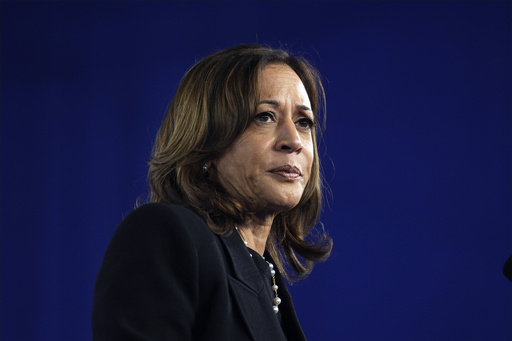
WASHINGTON — Interactions between protesters and presidential candidates can often lead to uncomfortable exchanges. They disrupt speeches, yell objections, and frequently divert a candidate’s focus. However, Vice President Kamala Harris has adopted a different approach in the lead-up to the election, utilizing these potentially awkward confrontations to energize her supporters and subtly position her critique against her Republican rival, Donald Trump.
During a series of rallies on Wednesday across North Carolina, Pennsylvania, and Wisconsin, pro-Palestinian demonstrators interrupted Harris’s speeches with chants, banners, and whistles. They aimed to voice their discontent regarding the Biden administration’s handling of the conflict between Israel and Hamas in Gaza.
For months, progressive activists have targeted Harris’ and President Biden’s events to draw media spotlight to their concerns. Typically, such disruptions lead to delays while security manages the situation, often resulting in tense moments. However, Harris’s recent strategy seeks to acknowledge the protesters’ concerns while simultaneously leveraging these interruptions to bolster her argument against Trump.
In North Carolina, when a protester accused her of “disrespecting the Palestinian community,” Harris swiftly pivoted to criticize Trump, stating, “We know we’re actually fighting for a democracy. Unlike Donald Trump, I don’t believe that people who disagree with you are the enemy.” Later, in Harrisburg, she reinforced her commitment to democracy, acknowledging its complexities while declaring it “the best system in the world.”
Even when protesters voiced their concerns at her final event in Wisconsin, Harris drew on a familiar defense from a previous debate with Mike Pence, stating, “We all want the war in Gaza to end and to get the hostages out, and I will do everything in my power to make it heard and known. Everyone has a right to be heard, but right now I am speaking.” These interruptions seem to have rallied the crowds at her events, overpowering the protest chants and fostering a sense of unity among her supporters.
In Wisconsin, the crowd’s response to the protests was so intense that another group attempting to disrupt her was drowned out entirely. Nevertheless, some pro-Palestinian activists express concern over Harris’s focus on democracy as a distraction from the urgent need for tangible outcomes. Dearborn City Council member Mustapha Hammoud articulated this sentiment, stating, “It’s nice her rhetoric has softened but the time for that has passed… we need actual outcomes.” Hammoud, a former Democrat, has grown increasingly dissatisfied with the party’s stance.
Disruptions from protesters are nothing new for presidential candidates. In 2016, Trump infamously suggested he would like to “punch” a protester in the face. Hillary Clinton faced consistent opposition from Black Lives Matter activists, with one event being notably interrupted for over ten minutes. In another instance, Jill Biden had to physically intervene when anti-dairy protesters confronted her husband on stage.
Unlike her predecessor Biden, who often maintained a more subdued approach, Harris has exhibited a more aggressive stance towards protesters since securing her nomination. Back in August, when pro-Palestinian activists interrupted her speech, she countered their chants directly: “If you want Donald Trump to win, then say that. Otherwise, I’m speaking.” The dynamic around Harris reflects her strategic efforts to transform protests into opportunities for rallying her base while addressing the issues at hand.
